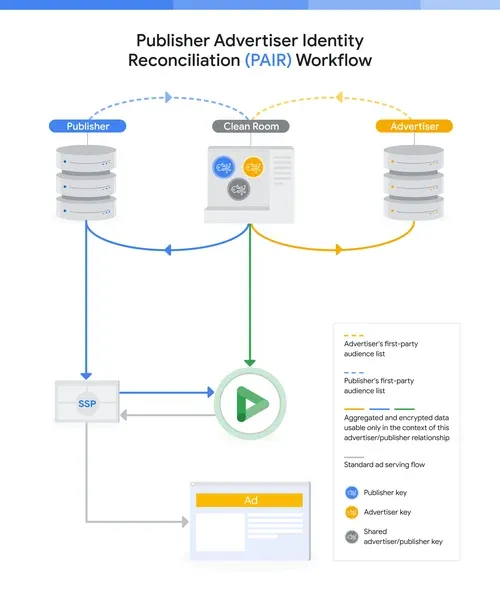IAB Tech Lab launches PAIR protocol for first-party data matching
New open standard enables advertisers and publishers to match audiences privately without third-party cookies.

IAB Tech Lab, the global digital advertising technical standards-setting body, announced the launch of the Publisher Advertiser Identity Reconciliation (PAIR) protocol on September 26, 2024. This new open standard aims to revolutionize how advertisers and publishers match and activate first-party audiences without relying on third-party cookies.
PAIR, which stands for Publisher Advertiser Identity Reconciliation, is a privacy-centric approach that enables advertisers and publishers to reconcile their first-party data for advertising use cases. The protocol uses advanced cryptographic methods, specifically commutative encryption, to allow secure matching of multiple-encrypted keys without exposing personal information.
The PAIR protocol was initially developed by Google's Display & Video 360 team in October 2022. Google subsequently donated the protocol to IAB Tech Lab for further development as an open industry standard. The Rearc Addressability and Privacy Enhancing Technologies (PETs) working group at IAB Tech Lab has since refined and expanded the protocol.
Key features and benefits
- Privacy-First Approach: PAIR protects end-user personal data throughout the operation using cryptographic protection.
- Interoperability: The protocol enables interoperability between data clean rooms and allows all Demand-Side Platforms (DSPs) to adopt it for enhanced privacy-safe audience targeting.
- First-Party Data Activation: Advertisers can activate matching audiences and engage potential customers who have interacted with their brands.
- Publisher Revenue Opportunities: Publishers can leverage authenticated users and match them with advertiser data while preventing data leakage.
- No Third-Party Cookies: PAIR operates without relying on third-party cookies, addressing growing privacy concerns and regulatory changes.
How PAIR works
The PAIR protocol involves several key steps:
- Key Generation: Data Clean Rooms (DCRs) generate unique encryption keys for publishers and advertisers.
- Data Sharing: Advertisers and publishers upload their raw ID lists to their respective DCRs.
- Encryption: DCRs encrypt the data using multiple keys, creating "PAIR IDs."
- Matching: DCRs match the encrypted PAIR IDs without decrypting the personal information.
- Output: DCRs generate outputs for publishers, advertisers, and DSPs, containing only the necessary information for each party.


Implementation options
PAIR can be implemented in three main ways:
- Single Data Clean Room with separate tenants
- Single Data Clean Room using a Trusted Execution Environment (TEE)
- Two interoperable Data Clean Rooms
Industry impact and reactions
The introduction of PAIR as an open standard is expected to have significant implications for the digital advertising industry:
- Unified Standard: PAIR will replace the Open Private Join and Activation (OPJA) specification, becoming the designated standard for secure data matching of advertiser and publisher first-party data within data clean rooms and programmatic activation.
- Improved Performance and Privacy: According to Shreya Mathur, Senior Product Manager at Google, "The increased performance and privacy offered by IAB Tech Lab PAIR will raise the confidence of advertisers and publishers in using their first-party data sets."
- Broader Adoption: Bosko Milekic, Co-founder and CEO of Optable, stated, "With a single unified first-party audience matching and activation standard, IAB Tech Lab is paving the way toward broader industry adoption of privacy-enhancing technologies."
- Interoperability: Andrew Knox, Product Manager for Privacy Technology at Decentriq, commented, "The integration of OPJA's data clean room interoperability with PAIR will be a great step forward for the industry. This now has the potential to become the premier way to protect and use first-party audiences."
- Streamlined Solution: Andrei Lapets, Vice President of Engineering and Applied Cryptography at Magnite, noted, "By bringing together the best innovations and insights from the two standards, the IAB Tech Lab is creating another streamlined, broadly applicable solution that SSPs, DSPs, and data clean rooms can jointly leverage as the modern advertising technology toolkit evolves."
Public comment period
The PAIR protocol is open for public comment from September 26, 2024, until October 25, 2024. Interested parties can review and provide feedback by visiting https://iabtechlab.com/pair.
Next steps
As part of the PAIR protocol launch, IAB Tech Lab will be:
- Updating the PAIR prebid module to be leveraged by all Data Clean Rooms and DSPs
- Publishing open-source reference implementation to support adoption by publishers
- Continuing to develop the protocol through the Rearc Addressability and Privacy Enhancing Technologies (PETs) Working Group
The launch of the PAIR protocol represents a significant step forward in the digital advertising industry's efforts to balance effective audience targeting with privacy protection. As the industry continues to shift towards privacy-safe solutions, IAB Tech Lab remains committed to providing addressability standards that help advertisers and publishers adapt and thrive in this new landscape.
Key Facts
- Announcement Date: September 26, 2024
- Public Comment Period: September 26, 2024 - October 25, 2024
- Protocol Name: Publisher Advertiser Identity Reconciliation (PAIR)
- Developed By: IAB Tech Lab's Rearc Addressability and Privacy Enhancing Technologies (PETs) working group
- Originally Created By: Google's Display & Video 360 team in October 2022
- Key Technology: Commutative encryption for secure data matching
- Replaces: Open Private Join and Activation (OPJA) specification
- Implementation Options: Single DCR, Single DCR with TEE, Two interoperable DCRs


